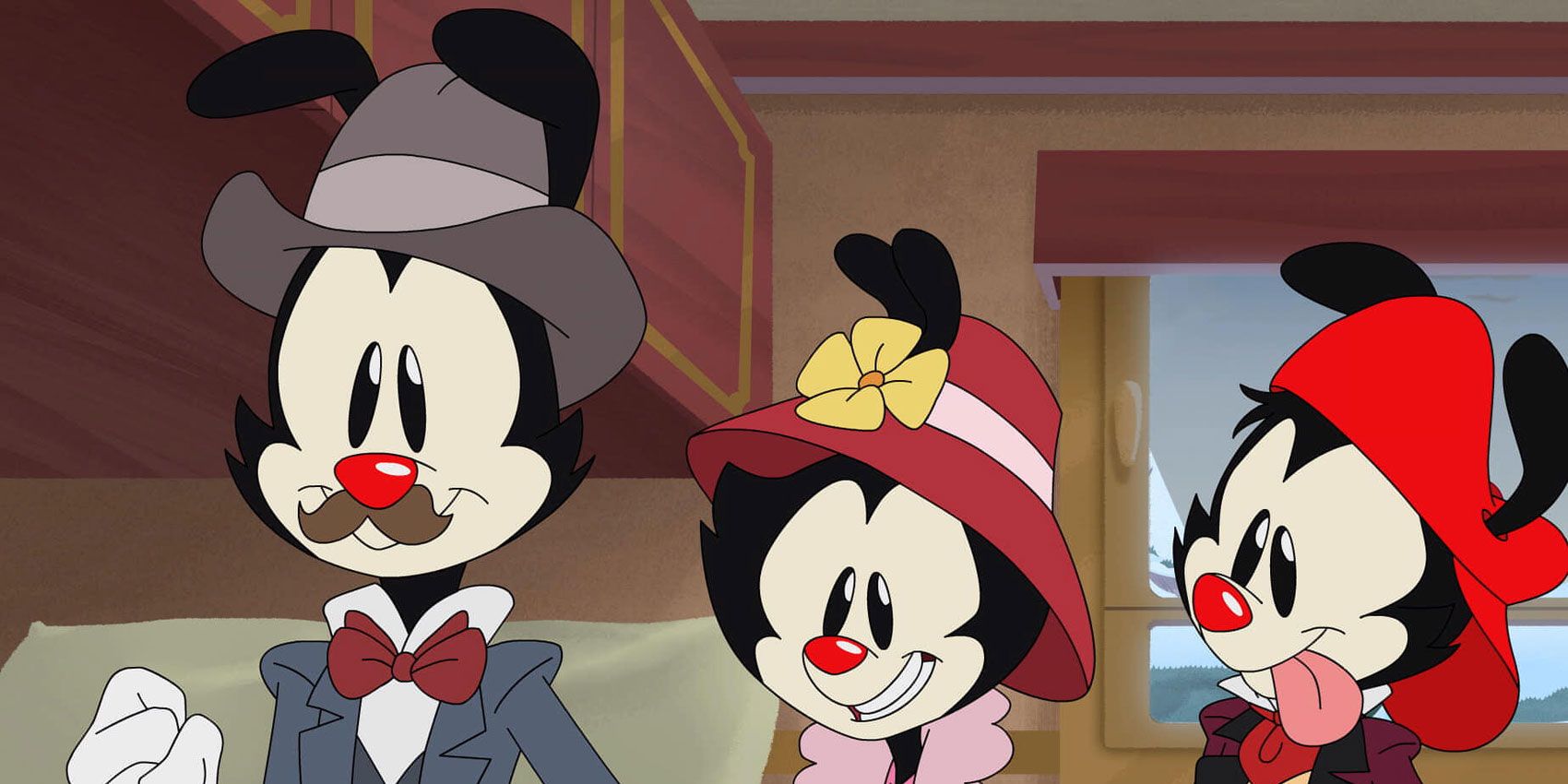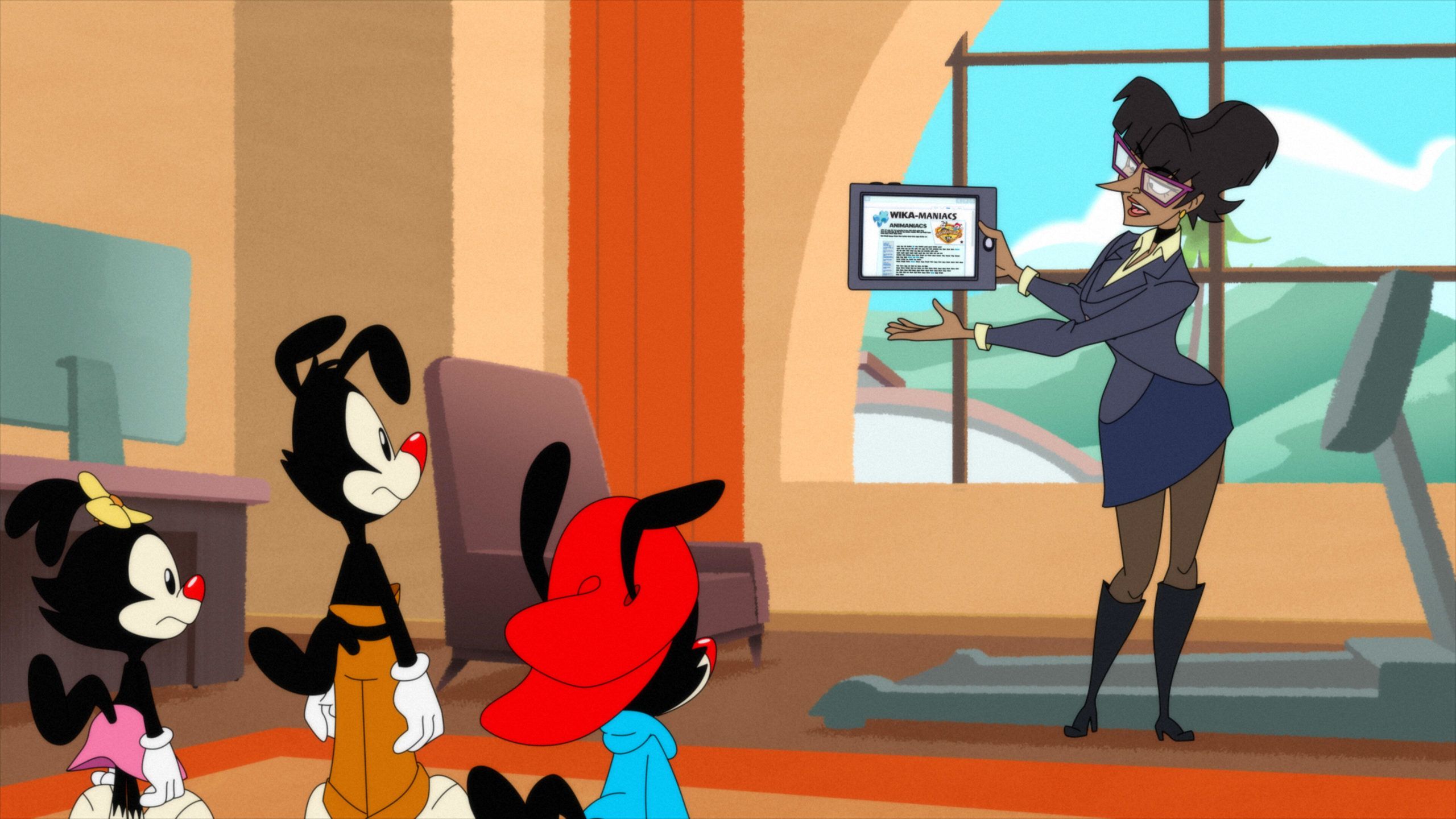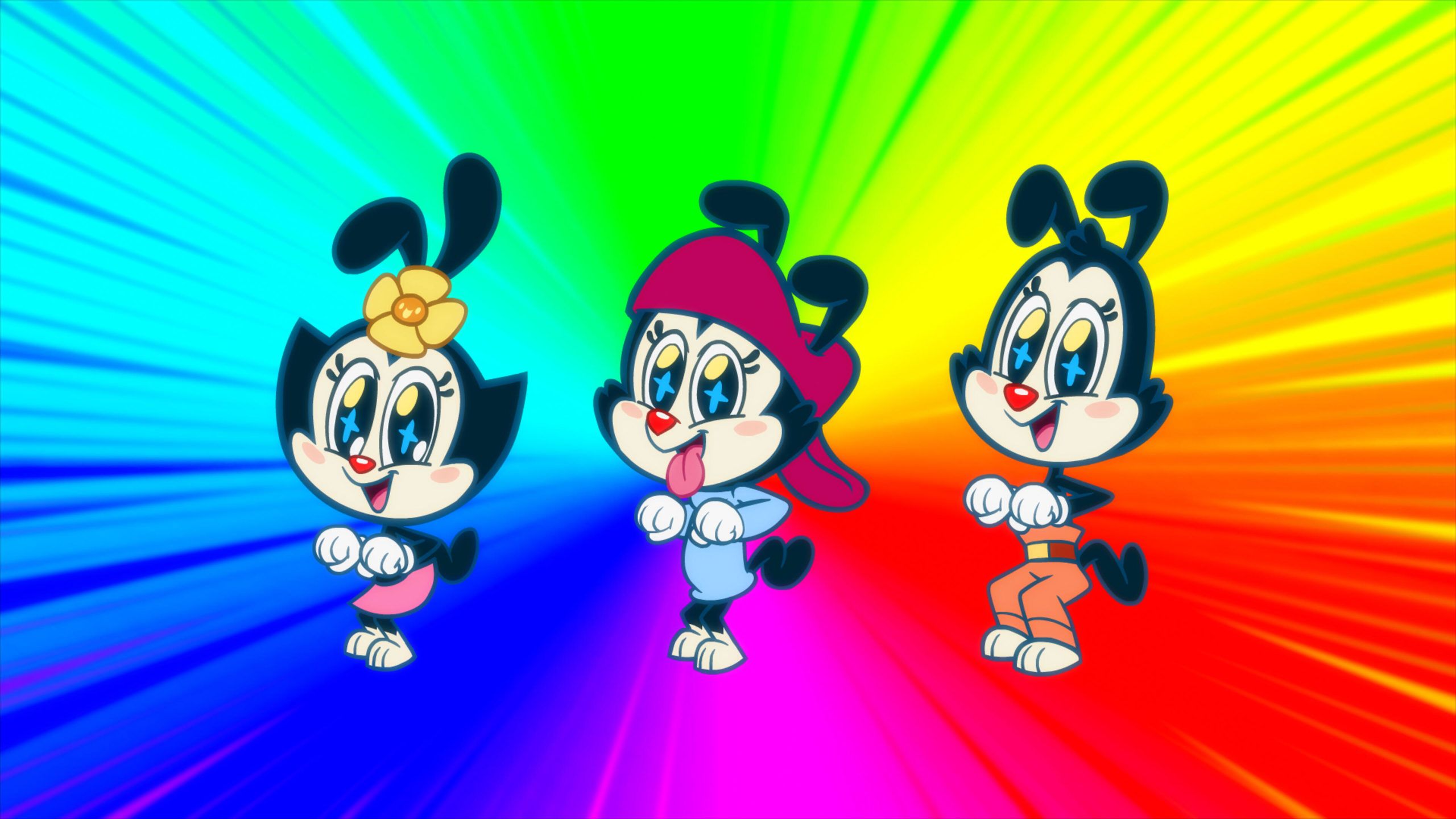In watching the five episodes of the Hulu Animaniacs reboot provided for review, someone could've made a timelapse video of my face and called it "Man Transitions from Smiling to Frowning." Episode 1 begins with that delightful Jurassic Park riff before cutting to that incredible, major-sixth chord-centered theme song we all know and love, and in that moment, I am all in. And then, about halfway through the newly recorded theme song, we get a lyric about how this new version is "gender-balanced," has "neutral pronouns" (with a corresponding visual of the Warners on a bathroom), and is "ethnically diverse." This, to me, was the beginning of the end, and as Animaniacs kept commenting on itself, its past, and its need to destroy our weak-ass PC culture, my frown kept frown, frown, frowning. Put it another way: The new Animaniacs never stops mansplaining, even if a new lyric claims it doesn't.
The original Animaniacs series aired from 1993 to 1998, with a simple premise and wildly complicated, impressive, self-referential, and culturally resounding gags, segments, and songs. Yakko (Rob Paulsen), Wakko (Jess Harnell), and Dot (Tress MacNeille) are the Warner Brothers — and the Warner Sister — who live in the WB water tower, run around the lot, and get into all kinds of mischief. Beyond these central stories, we also had similarly iconic sub-shows like Pinky and the Brain (Paulsen and Maurice LaMarche, respectively), featuring two laboratory mice with wildly differing IQs who try to take over the world. These base realities gave the Animaniacs crew free rein to deliver Gilbert and Sullivan-esque patter songs about geography, episode-length genre parodies, and a general sense of chaotic silliness delivered smartly. It played to kids, it played to adults, it spoke to everyone like they were on the same level.
The 2020 version of Animaniacs, conversely, speaks to everyone like they're stupid idiots, and that the 2020 version of Animaniacs is the only bastion of intelligence in a stupid, idiotic world — that is, when it's not calling itself a stupid idiot for daring to dream of recapturing its '90s magic. This shift in POV is not only needlessly mean-spirited and cynical, but represents a fundamental misunderstanding of the original series' comedy math. It's very plainly explained in the theme song, even in this new version, that the Animaniacs themselves are "zany to the max," that they cavort around "just for fun," and that authority figures are constantly trying to stop them and lock them back up. Comedically, the Animaniacs are our "unusual characters," and the world around them is our "voice of reason." This central trio is who are zany, who cause chaos, who disrupt the normal base realities of our more reasonable reactionary characters.
Not so in the new version. Here, the returning cast and new showrunner Wellesley Wild (of Family Guy fame, which brings a lot of this show's venomous new tone shift into context) paint the Animaniacs as our voices of reason; our figureheads of intelligence reacting to a world gone mad; our Jim Halperts, not our Michael Scotts. The opening crack about how wild and funny it is that bathrooms have gender-neutral signs is only the tip of the iceberg of this strangely conservative-leaning shift in comic voice. "Woke jokes" run rampant, with trite and hackneyed observations about current-day hipsters and how sensitive they are. The scripts stare at our modern world with a head on a swivel, eager to poke at every single aspect (especially if it involves a modicum of progressivism, but also if it involves joked-to-death topics like Russian trolls and Trumpism) and call it dumb. Instead of successfully having bite, it plays more like obviously fake vampire teeth — and it sidelines three of our most splendidly wild animated comedy characters into delivering arms-folded, uninvested wisecracks about stuff happening to them, rather than making stuff happen. At one point, a caricature of Seth Meyers is seen drinking from a mug that reads "Smug," which is about as explicit a "pot calling kettle" moment as I've ever seen on television.
Self-awareness has always been part and parcel of the Animaniacs vibe, stepping in the "family-friendly but surprisingly sharp vaudeville programming" traditions of The Muppet Show with aplomb. But in this new series, "self-awareness" becomes a pervasive Achilles heel, a surefire stopping of any story momentum — or even any desire to tell a story. 2020 Animaniacs is obsessed with itself being a 2020 reboot of a 1990s cartoon, and furthermore, it hates itself for being one. I can respect and understand the first episode being predicated on and stuffed with jokes about being a reboot, a money-grab, a representation of Hollywood's loss of creativity. But to keep pounding this comedic avenue for at least five episodes of a 13-episode season yields diminishing returns nearly immediately.
It's perverse how often one of the characters will stop everything to comment on how the show is a "biting satire," with zero variation in phrasing. It's maddening how little Animaniacs wants to tell new stories or write new songs when it's content on living within quotation marks of "the 1990s animated series Animaniacs." At one point, the Animaniacs travel to Russia to make fun of a Russian reboot of Animaniacs, becoming an in-universe commentary on why it's a bad idea to reboot Animaniacs in any capacity. It's stuck, and it loves being stuck. It seems to acknowledge writing new stories is hard, and instead of even trying, it just cooly states how cool it is to self-efface. It's like Dan Harmon and the writers' room of Last Man Standing had to come to a creative compromise, and no one was happy as a result, and the show is about how no one was happy as a result.
Phew. That's a lot of negativity to expound on a cartoon, no matter how designedly negative the cartoon is. So, here's what's positive about the 2020 Animaniacs: No episode featured a one-off gag I didn't at least chuckle at. Its shorter tags consistently delivered, especially one riffing on the nonsense of sports press conferences that hits the sweet spot of effective meta-jokes pretty damn well. The new version of Pinky and the Brain, a short of which was in every episode watched for review, is pretty much a constant win. It has tonally shifted into hard-sci-fi, Black Mirror-esque stories to fruitful results (telling new stories in a reboot, what a concept!), it actually has some stuff to say about emotionally enjoying things (Pinky) versus intellectually hating things (Brain, the rest of the 2020 Animaniacs), and it has some delicious physical comedy and surprisingly smart joke-writing — it's no exaggeration to say if Hulu had rebooted Pinky and the Brain as a series of 10ish minute episodes while scrapping Animaniacs entirely, I'd be writing a very different review. And in one episode, we get a short piece of animation called "Starbox and Cindy" that feels like a radical breath of fresh air, with a unique animation style, lovely tone of voice, and cleanly delineated comedy math. It was more akin to watching a Pixar short than something within the established world of this new Animaniacs, and I wanted more.
"Starbox and Cindy," Pinky and the Brain, and any of the smaller wins embedded within the series only serve to demonstrate just how aggravatingly, mean-spiritedly unnecessary the rest of the series is. There are countless animators, storytellers, and artists dying to make animated content that feels new, fresh, even just "interested in being a television show." To spend so much time on this show that hates itself for existing and everyone else for watching just reminds me of how much opportunity there could be for stories that are demanding to be told, to entertain, to progress, to make the world an invitingly zanier place. Instead, time and money is spent, cynically, by its own admission, on a vision of meanness, stunted growth, and negativity. I think it is no longer time for Animaniacs.
Grade: C-
The new Animaniacs comes to Hulu Friday, November 20.



